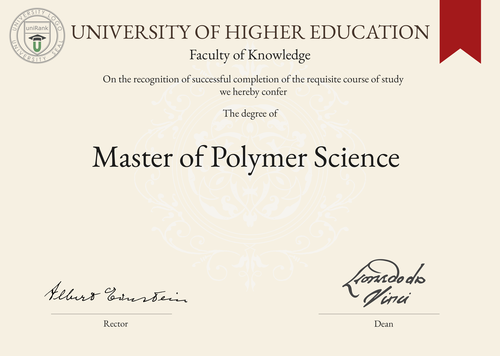
Master of Polymer Science (MPS)
Guide to Master of Polymer Science Program/Course/Degree
Master of Polymer Science (MPS)

Program Name
Master of Polymer ScienceProgram or Degree abbreviation
MPSDuration range
The duration of the Master of Polymer Science program typically ranges from 1 to 2 years.Tuition range
The tuition fees for the Master of Polymer Science program can vary depending on the chosen country or university. Please refer to the specific university's website for accurate information.Overview
The Master of Polymer Science program is designed to provide students with an in-depth understanding of the principles and applications of polymer science. This interdisciplinary program combines theoretical knowledge with practical skills to prepare graduates for careers in various industries related to polymers.Curriculum Overview by year
The curriculum of the Master of Polymer Science program is structured to cover a wide range of topics related to polymer science. The following is a general overview of the curriculum by year: Year 1: - Introduction to Polymer Science - Polymer Synthesis and Characterization - Polymer Physics - Polymer Chemistry - Polymer Processing Techniques Year 2: - Advanced Polymer Science - Polymer Engineering - Polymer Composites - Polymer Rheology - Polymer NanotechnologyKey Components
The key components of the Master of Polymer Science program include: - Comprehensive understanding of polymer chemistry and physics - Hands-on experience in polymer synthesis and characterization techniques - Knowledge of polymer processing and engineering principles - Familiarity with advanced topics such as polymer composites and nanotechnologyCareer Prospects
Graduates of the Master of Polymer Science program have a wide range of career prospects in industries such as: - Plastics and rubber manufacturing - Chemical and materials research - Biomedical engineering - Automotive and aerospace industries - Consumer goods and packagingSalary Expectations
The salary expectations for Master of Polymer Science graduates can vary depending on factors such as the country, industry and level of experience. On average, professionals in this field can expect competitive salaries with opportunities for growth and advancement. For a more accurate understanding of salary expectations, you can utilize the Job Sites Search Engine, from our sister site jobRank, which searches over 4,600 job sites worldwide. Make sure to specify not only the job title but also the country you are interested in.Conclusions:
It is important to note that the duration, tuition fees, curriculum, key components, career prospects and salary expectations of the Master of Polymer Science program can vary depending on the chosen country or location of study, as well as the specific university. Prospective students are advised to research and compare different universities and programs to find the best fit for their academic and career goals. Visitors interested in pursuing a Master of Polymer Science degree can use the uniRank World Universities Search Engine to find universities offering this specific degree anywhere in the world. This search engine provides a comprehensive database of universities and their programs, allowing individuals to explore various options and make informed decisions about their education.World Universities Search Engine
search for Master of Polymer Science (MPS) and add the Location (country, state etc.) or specific University you are interested in studying at.
Query examples:
- Master of Polymer Science (MPS) United States
- Master of Polymer Science (MPS) United Kingdom online
- Master of Polymer Science (MPS) Australia international students
- Master of Polymer Science (MPS) University of California
- Master of Polymer Science (MPS) University of London tuition fees
- Master of Polymer Science (MPS) University of Sydney scholarships
Share Program/Course
Interesting? Share this program/course/degree info with your friends now.